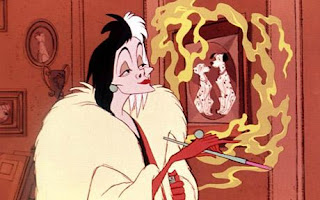Femme fatale rejects traditional portrays of women and are a direct on the nuclear family. She refuses to be a dutiful wife and has no aspirations to be married as marriage to her closes off excitement often being sexless and loveless. As Janey Place points out, "She is not often won over and pacified by love for the hero, as is the strong heroine of the forties who is significantly less sexual than the film noir woman." Highlight the double standards whilst women must be outstandingly attractive it is the unconventional looking man that she falls for. Similar to Disney the woman’s appearance is vital and she must appear to be flawless.
She remains fiercely independent even when faced with her own destruction. And in spite of her inevitable death, she leaves behind the image of a strong, exciting, and unrepentant woman who defies the control of men and rejects the institution of the family. Enchanted (2007) also has an inevitable ending however it often results in the ‘evil’ characters death rather than protagonist yet the message is clear the ‘whore’ always dies leaving behind the innocent virginal character.
Classic femme fatale resorts to murder to free herself from an unbearable relationship with a man who would try to possess and control her, as if she were a piece of property or a pet. According to Sylvia Harvey, the women of film noir are "[p]resented as prizes, desirable objects". Although women are indirectly sexualised they remain the trophy for the man with little focus placed upon her intelligence. Often it is the man enticing the women but she is labelled as the ‘bad one’. Edward in Enchanted also lures Giselle to break the traditional story of a princes getting the princess however, Giselle is not punished because ultimately she is a virgin.
They feel trapped by husbands or lovers who treat them as "standard equipment" and by an institution — marriage — that makes such treatment possible. Marriage for the femme fatale is associated with unhappiness, boredom, and the absence of romantic love and sexual desire. In some films, the husband's lack of interest in his wife seems almost sadistic. Despite men being in control of women in Disney films they are put on a pedestal and respected in contrast to the poor treatment of femme fatale’s.
Another sign of the sterility of film noir marriages is the absence of children produced by these marriages. Childless couples are far more common in film noir than the traditional father-mother-children nuclear family. However, Disney films depict women with installed maternal instincts and imply that after marriage they conceive bt Enchanted (200) sees Giselle becoming a step-mother. It is possible that Enchanted (2007) is challenging traditional stereotypes as she is a ‘’good’ step-mother but also fits in with the diversity of modern families.
The family home only intensifies this atmosphere of coldness and entrapment for the married femme fatale. The lighting and mise-en-scène of the family home contribute further to its image as a trap whereas the bright spacious apartment in Enchanted (2007) exemplifies Giselle’s freedom.
Noir films create this image of the strong, unrepressed woman, and then attempt to contain it by destroying the femme fatale or converting her to traditional womanhood. Her determination to change often leads to her death and like Disney implies that we are born with certain characteristics that we can not change. She refuses to be defined by the male hero or submit her sexuality to the male-dominated institution of the family; instead, she defines herself and resists all efforts by the hero to "put her in her place." Akin to this Giselle never changes herself to impress Edward which is partly the reason he feel in love with her.
The explicit messages of film noir seem to be clear regarding women and the family: Women who transgress the boundaries of conventional family life meet with and deserve the most extreme punishment, and the men who fall victim to their sexual charms meet a similar fate. The simplistic message is also echoed by Disney that if a character goes against stereotypes they are severely punished and good always triumphs over evil.
It could also be argued that the Femme fatale never achieves ultimate control because she dies and uses her sexuality to lure men. Similar to Disney’s women’s intellectual attributes are ignored. However, the duplicity nature of the women highlights intelligence unlike the passive Giselle. Overall, ‘evil’ women are always punished whilst the innocent character is rewarded no matter what the genre.



